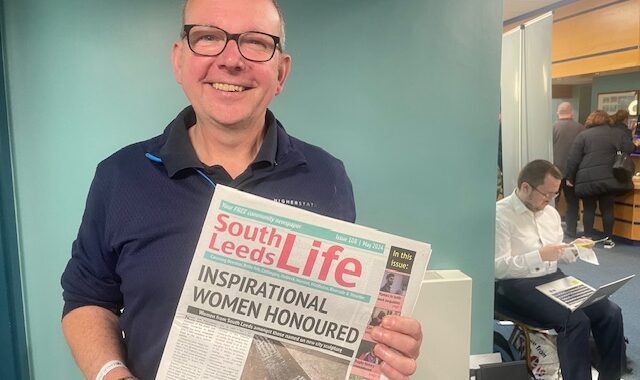We invited Joe Willis, who quit a regional daily to set up his own hyperlocal website in North Yorkshire, to tell us how it’s done.
The award-winning journalist was previously the social media editor at Newsquest’s The Northern Echo but left after feeling dismayed at the state of local media. He set up Richmondshire Today in July last year, with the site receiving more than 766,000 page views and 226,000 unique visitors since then, funded solely by selling advertising space.
When I started in the local newspaper industry as a trainee journalist around 15 years ago, the internet was yet to make much of an impact on the industry.
My first paper – the Northants Evening Telegraph – still had a library full of telephone directories, local history books and encyclopaedias which the desk would refer you to when you needed background info or to trace someone.
The paper had maybe 20 reporters and five photographers covering that corner of Northamptonshire, including five for the relatively small – although very newsy – town of Corby.
I didn’t realise it at the time, but this was the best I was going to see in terms of resources on a local paper.
After passing my NCE I moved back north and got a job with the much-respected Northern Echo. This was in mid 00s. The internet was still not having much of an effect, and if the bosses were aware what was around the corner, nobody let on to us.

The homepage of Richmondshire Today
We had staff photographers, sub-editors, night editors, deputy night editors, a researcher, a librarian and even an editorial assistant.
I started in a district office where there was also a reporter for the sister weekly paper, the Darlington and Stockton Times. There was a friendly rivalry which would often see us turn up at the same events or meetings hoping the other wouldn’t make it.
It was hardly times of plenty but you did feel you had the patch properly covered between you. And there was even a paid-for staff Christmas party.
“Why can’t someone sat in their pants at the kitchen table be just as successful as attracting those all-important hits and unique users?”
Twelve years on and things have changed.
That district office is long gone along with several others. Dozens of staff at head office have moved on, or been moved on. And the Christmas parties have been cancelled, although that’s not necessarily a bad thing.
It’s been hard, painful process even for those who kept their jobs. Although I rarely missed one, union meetings – when all the bad news, rumours and grumbles would come tumbling out – were horrid.
Journalism is a wonderful job, but I’d sit at my desk after that hour in the upstairs room of the Red Lion in Darlington and wonder if a well-paid job in a council press office might not be a good move.
But as the paper slowly and belatedly focussed more on the internet, it struck me that there was another way.
Websites cost next to nothing to set up and can easily look professional if you use off-the-shelf technology. And if staff, sat in a newspaper office owned by a multi-national company, can use Facebook to drive traffic to a site with a few very basic skills, why can’t someone sat in their pants at the kitchen table be just as successful as attracting those all-important hits and unique users?
After all, it’s often said but, possibly not always understood, that content is king.

Joe Willis, former North-East Journalist of the Year
It’s not the paper or the website that’s your product, it’s the news, the information, the service you are providing – telling people stuff they didn’t know.
Write it (good, unique content) and people will come (if you stick it all over Facebook).
“Foolishly journalists look down on advertising staff. It’s wrong but they do. They’re viewed as loud and brash. I’d always thought that those were the kind of qualities that you needed to flog advertising space. You don’t”
That was half the half-baked plan when I handed in my notice earlier this year. The other half was to fund the site by selling advertising to local companies.
I love the idea that a local news service can be provided by subscriptions from grateful readers or grants from public bodies, but I am not convinced this is sustainable for a news organisation.
Rather than go down the Google Adwords approach, I decided to sell banners to local firms and organisations for the same price as they would pay to go in the local classified directory that drops through the door every month.
The site was up and running very quickly thanks to help from a local web design company who used a simple WordPress theme and a few plug-ins to get us going.
It doesn’t look amazing but it does what it’s supposed to for now. And most importantly it’s responsive and works well on a mobile phone.
If you’re using Facebook to drive traffic to your site you’d better make sure your site works great on a mobile. In the first few days I was shocked to find that about 80 per cent of our users came to the site via their phones. Presumably, these figures would come as a surprise to advertisers paying for the huge leaderboard and skyscraper adverts that you often see on newspaper websites.
Before I set up the site I was confident about providing the content. I was looking forward to it. I saw it as a chance to immerse myself in the patch – Richmondshire in North Yorkshire – an area I’ve lived in most of my life and love dearly. And I kind of hoped that I’d be able to cope with the technical side of running my own on-line newspaper.
The advertising was a worry though. Foolishly journalists look down on advertising staff. It’s wrong but they do. They’re viewed as loud, extroverted and brash, and in my ignorance, I’d always thought that those were the kind of qualities that you needed to flog advertising space.
“I’ve found that if you have a decent offer and ask politely and professionally, people will give it a try”
I’m not any of those things and worried that I couldn’t cut it. I also worried that businesses used to advertising in paper products would be unwilling to advertise on-line.
But yet again while Facebook is hoovering up vast percentages of UK advertising revenue in the form of boosts and sponsored content, it is also showing people that on-line advertising does work.

Ultimately, I’ve found that if you have a decent offer and ask politely and professionally, people will give it a try. And if they give it a try and it works for them because you’re getting enough visitors, they will keep their adverts on the site.
It’s difficult trying to strike a balance between writing stories and selling advertising but as long as you accept that the commercial side is just as important as the content side, that balance just seems to happen.
“I enjoy the commercial side just as much as the reporting.”
Six months on and we’ve have had some great successes – one story got 40,000 unique users despite us selling it to a couple of nationals first. We’ve got some great advertisers, including the district council, the county council, and some large local companies.
It was a strangely proud day too when after two failures, we were accepted into Google News. We get on average about 2,000 unique users a day. I know that if we get that number, we will get a good number of click-throughs to our advertisers’ sites and hopefully they will get some business.
I have found that I enjoy the commercial side just as much as the reporting. To make a site with this model sufficiently successful to fund the journalism, I believe you have to become something of an entrepreneur and try to find other income streams, which we are working on now. But the reporting is still key.
It’s the car accidents, crime and the like which may get you the huge numbers of hits, but I’ve been delighted that other proper parish pump stories have done well for us.
I keep saying ‘us’ and ‘we’, but it’s mainly me, although we (I) have teamed up with a fantastic local photographer who is prepared to take pictures for us in return for free publicity.
A couple of retired local journalists are also very kindly writing for the site which is a huge boost, both in terms of providing good copy and having someone to bounce ideas off.
It’s still very early days for our site richmondshiretoday.co.uk. I’ve got four kids and a mortgage so it was a preposterous and foolhardy idea to start a new business in an industry that has seen such cuts and is facing such uncertainty. But after ten years of watching decline being managed, it feels good, if terrifying, to oversee something that is growing and be part of the breed of hyperlocal news organisations that are starting to emerge.
Being a journalist is fun, exciting and worthwhile, and being an entrepreneurial local journalism running your own company means the fun, excitement – and risk – are doubled.
If you have a story that you’d like to share with us, please get in touch with Matt on [email protected]




